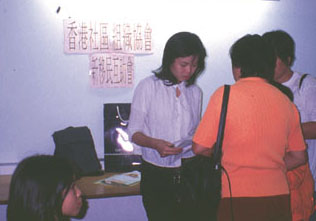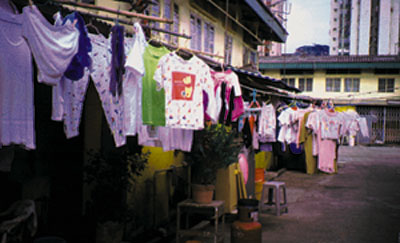 Giving hand
Giving handSociety works to aid
immigrants from China
By Label Lee
To recent immigrants, Hong Kong is a place full of strangers. Encountering many difficulties in adapting, newcomers may find solutions to their problems with the help of many sectors of the community and the mass media.
Some middle-aged men from Hong Kong marry Mainland women. Although many of them hope eventually to be united with their wives and their Mainland-born children, usually only the children are permitted across the border into Hong Kong. These single-parent families cause many problems.
Being the breadwinners, the fathers have little chance to communicate with their children, not to mention give them proper care.
Mr. Ng King Wai, 55, the father of two daughters and a son, ran into financial problems when he became unemployed. The recent arrival of his wife further added the burden.
He said, "I have to afford the high rent for my flat, which is 60 to 70 square meters. I hope the government will grant me public housing. Following the existing procedures of the Housing Authority, I have to wait for 5 years."
According to Miss Sze Lai Shan, community organizer of the Society for Community Organization, a family more than half of whose members have stayed in Hong Kong for less than 7 years are not qualified for the application.
"This is unfair to the new immigrants, since it is merely a form of discrimination against them," she added.
A 13-year-old boy, Lee Tai Lai, has been living in the Territory for 2 years. Being the youngest in his family, his father arranged for him to come to Hong Kong. His father expected him to have better prospects for study and his career.
He said, "My father has been living in the city for more than 10 years, so I fear nothing. But still I needed 2 years to adapt entirely to local society."
The language barrier is an obstacle in studying. Lee and classmate Chan Kam Chin even didn't know the 26 letters of the English alphabet when they came to Hong Kong. Learning Cantonese was also a problem.
Lee, who still speaks with a Mainland accent, said, "I dared not to speak in Cantonese until I realized I had learnt enough from watching TV."
 In their early days in Hong Kong, the two boys took part in tutorial classes held by community centres such as the Young Women's Christian Association, Caritas Hong Kong.
In their early days in Hong Kong, the two boys took part in tutorial classes held by community centres such as the Young Women's Christian Association, Caritas Hong Kong.
Both of them found the tutorials useful to build up a foundation in language. Chan also participated in an adjustment course carried out by the YWCA, but he said the program was less effective.
"It organized some tours around the city and taught us to be courageous when facing new and strange things, but it was not useful to me," Chan frankly said. They agreed unequivocally that school teachers were helpful in their studies, especially English.
"Sometimes we stay in school after lessons with teachers giving extra tutorials," Chan said. Now they can keep up with the academic levels of their classes. Added community organizer Miss Sze: "We have established service networks for immigrants to help each other in times of difficulties. Moreover, we hold tutorial classes and adjustment courses for children below 15."
Miss Sze added they refer special cases to government departments such as the Labour Department, the Housing Authority and the Social Welfare Department. Mass media like newspapers and radio stations have stretched out their hands to help new immigrants as well.
The Oriental Daily has set up a letter box providing professional and legal advice. Some cases are passed to government departments for further assistance. According to Mr. Tony Woo, producer of Current Affairs Salon on Radio Television Hong Kong, his program was inspired by the death a new immigrant who failed to cope with problems in Hong Kong.
He said, "The program was broadcast once a week in August and September. Inquires received included housing, education, emigration procedures and ways to get along with the locals.
"We invited social workers to answer their questions," he added.

January 1997
Return to contents
